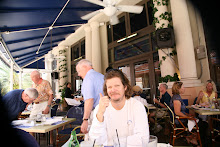The Life Cycle. . .
For the last couple of years a pair of Canada geese have been visiting the pond here at Camp Burning Toast and I noticed the other day that they had been staying through the night, which has not been the norm for them in the past. Usually they would depart at dusk to bed down somewhere else only to return later the next day, so this behavior of lagging around is unusual for them to say the least.
It was not until I paid a visit out the the point that juts out into the pond that I made a profound discovery!
Seems these geese have been busy bumping feathers and have decided that this pond would be a great place to raise a gaggle of geese babies!
Of course, I cannot live with a goose nest unless I know all about geese, so this is what I have learned in the process:
Canada geese are lifetime mates and generally do not mate until their forth year with the female doing the nest building and incubating of the eggs as the male stands guard. Incubation of the eggs takes from 25 to 30 days and the goslings will enter the water within one day and a typical brood is from 4 to 7 eggs. Also, adult shed their flying feathers once a year making them earthbound for weeks, the male soon after mating and the female about five weeks after the hatch. Both adults regrow their feathers, which usually coincides with the flight feathers of the maturing goslings. A family that flies together, stays together.
I did not disturb the nest to see how many eggs were present mainly because I like surprises, but also because male geese can be rather fierce. I prefer to no be attacked by large waterfowl, there is something, oh, I don't know. . .kinda scary about that!
So, I kept my distance and the geese gave a few residual honks as I left the nesting area.
I hope that all the little birds make it, but the beginnings of life will be very difficult for them. There are some large bass in the pond, not to mention snapping turtles, snakes and others aquatic beasts.
And don't forget Wildcat and his sick fascination with these large birds.
Bad, bad Wildcat!










The first thought that came to mind when I read this post was if the pond has largemouth bass. I'm not much of a bass fisherman Toast but I can remember reading somewhere that they'll attack and eat anything they can get their mouths on. I had a picture somewhere of a Florida strain largemouth with a duckling in its mouth and a gleam in its eye.
What would you call a bass/geese concoction - a bassducklin?